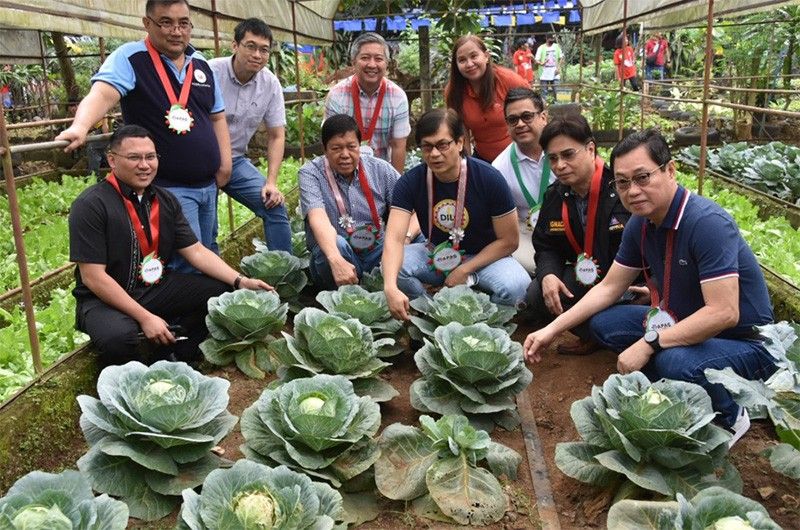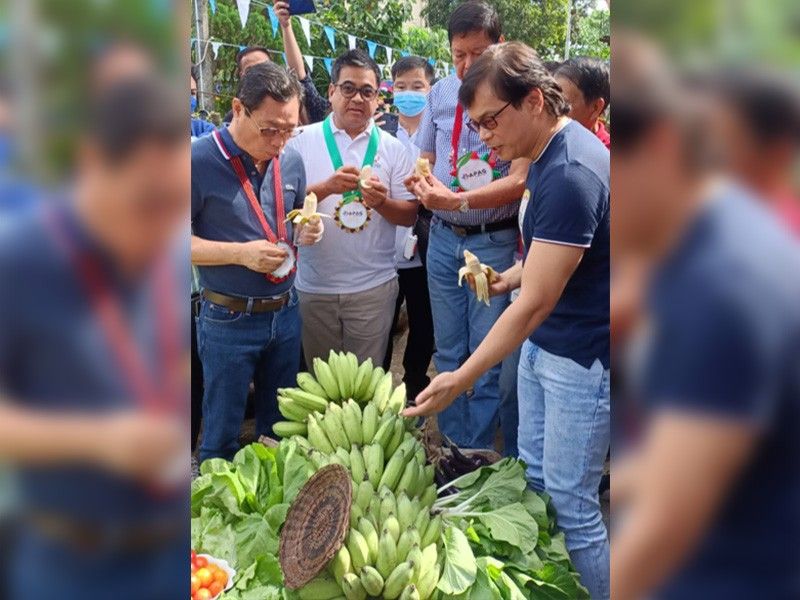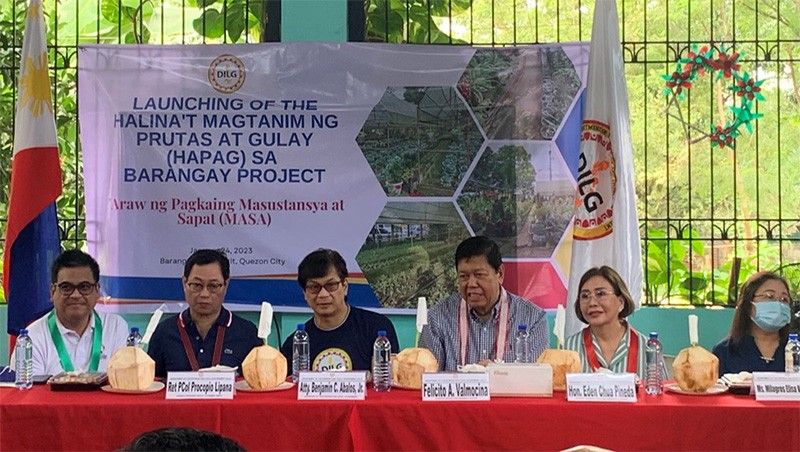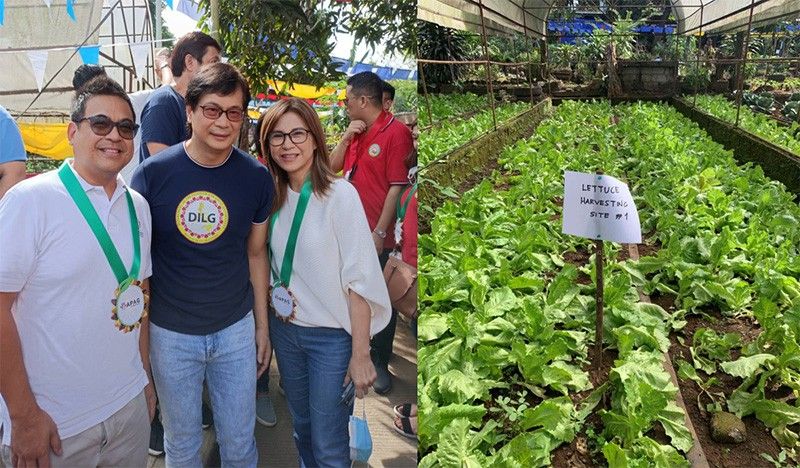GrowQC and DILG’s HAPAG: Spreading food security from QC to the whole nation


The world is faced with so many crises—from the Russia-Ukraine war to global inflation, climate change to the continued threat of COVID-19. Sadly, though, the world is faced with another concern that may not be so familiar to a lot of people but is just as alarming—food security. Most of the planet’s close to 8 billion inhabitants are threatened by mass hunger, famine, and malnutrition. We, Filipinos, are no exception.
I’m happy that my hubby Nonong and I share a common advocacy for urban farming. It’s something we’re both passionate about, not only because it’s always nice to source your favorite veggies straight from your own backyard, but we’ve always put a premium on our kids’ nutrition, especially since I’m also a Nutrition Ambassador of the DOST - Food and Nutrition Research Institute (FNRI). A lot of Filipino kids are now stunted, a problem that could’ve been easily solved if children and pregnant women had more access to vegetables.
We’re lucky that for us in the family, being plantitos and plantitas is a matter of choice; we don’t do it out of a necessity. Growing greens is a hobby, a form of family bonding. But this is not the case for many of our kababayans.
For those living below the poverty threshold, planting vegetables in their backyard gives them the much-needed assurance that they’ll have something to eat for their next meal and for the other meals to come. For them it’s, quite literally, for survival. It gives them peace of mind and a free source of good nutrition.
Recognizing the gravity of this problem, the Quezon City government, led by Mayor Joy Belmonte and Nonong as Co-Chair of the Food Security Task Force – created the GrowQC food security program in 2020. The Galing Pook-recognized project was initiated in response to the lack of food supplies during the COVID19 pandemic. Years later, it is now considered one of the best practices that showcases barangay urban farming at an astronomical level.
GrowQC’s success inspired the Department of the Interior and Local Government (DILG) to launch on Jan. 23 the nationwide HAPAG (Halina’t Magtanim ng Prutas at Gulay) sa Barangay project, using the initiative as a template.

The Bulaklakan Integrated Urban Farm in Brgy. Holy Spirit where HAPAG was launched is one of the 1st urban farms in QC. Incidentally, I remember already featuring it when I was still a rookie reporter more than a decade ago, interviewing DILG Usec. Chito Valmocina – who was then the longest-serving barangay captain of Brgy. Holy Spirit.
Interior and Local Government Secretary Benjamin Abalos Jr., in his message, encouraged everyone to engage in urban farming as well as composting, practices that address both food security and waste management. Besides helping individual households, the activity also fosters a sense of community among residents. Aside from planting in their own backyards, they can also plant together in identified vacant areas in their barangay, a perfect bonding moment for the neighborhood Marites or Zumba club regulars. Barangay officials are requested to assign areas for their respective community gardens with at least two hundred (200) square meters of land area. Those who don’t have vacant areas of that size may opt for container gardening, hydroponics or aquaponics technologies.
President Bongbong Marcos had time and again commended Belmonte and the Quezon City government for their food security program which is also a priority program of PBBM.
“Magtanim tayo ng gulay sa sarili nating bakuran. Alam natin sa ating mga island economies/barangay, o dito sa Metro Manila, hindi naman natin kaya itanim sa ating lugar ang lahat ng gusto natin kainin. Pero pwede kang mag-ambag para mapagsama-sama sa tanim naman ng iba,” says Nonong, and I agree with him on this. Our concerted efforts will surely make a lot of difference, especially for the little ones who are in much need of proper nutrition.

He adds that once the barangay farms and gardens have been established, the next step is to improve food systems and the flow of food.
How can these be achieved? Nonong emphasizes that an enabling environment is of utmost importance if these goals were to be realized. “Kailangan magsimula tayo at mag-prioritize. One of the best practices na ginawa namin is to create a hunger map. Hanapin muna saan ang pinakamaraming food insecure at doon unang gawin ang mga proyekto. Data can help.”
During the launch, Aling Madonna shared that she been planting vegetables at the Bulaklakan Integrated Urban Farm in Brgy. Holy Spirit. She has been doing it for the past six years, saying it helps augment the family’s meager budget by putting food on their table. She hopes that the practice will eventually spread to other barangay because there are other families like hers which can benefit from it.
“(Urban farming) opened our eyes during the pandemic,” Sec. Abalos shares. “Nakita naman natin ang kahalagahan ng kalikasan, ang kahalagahan ng ganitong proyekto.” The pandemic and the lockdowns caused many of us to lose our jobs and decimated our savings in the blink of an eye. Thanks to efforts such as GrowQC where the local government distributed free seed starter kits, families aren’t only given a measure of food security, their sense of dignity and pride is also restored.

And of course, with an improved urban farming and food security program, there’s also better nutrition. As I mentioned earlier, many Pinoy kids are stunted mentally and physically, meaning they’re small for their age and they have a difficult time learning in school. Unfortunately, the effects of stunting are irreversible.
According to a National Nutrition Survey Report in 2015, one out of three Filipino children has stunted growth. Imagine, these are our country’s future leaders we’re talking about! The root of all these? Malnutrition.
Abalos shares that Mandaluyong had the same problem when he was its mayor before. Things were so bad in his city that out of the 16 cities and once municipality in the NCR, they ranked 16th. “Tyinaga namin ito hanggang sa naging No. 1 kami sa honor roll sa buong Pilipinas sa nutrition at sa pagiging child-friendly. We go to each barangay, tinitimbang namin bawat bata at kung sino ang nahuhuli doon kami nagko-concentrate. We could do that all over the country.”
“A nutritious diet makes a lot of difference, like adding malunggay (to family meals). We will be solving this problem; all we need to do is go to the ground [and plant],” says Sec. Abalos.
For now, Abalos says the DILG will conduct an inventory to know where they can start urban farming. They are now coordinating with the Agriculture Department and barangay officials to ensure the project’s smooth implementation.
It’s nice to know that the city I live in has this kind of a project, but we still have a long way to go if we are to have better food security in the country. As of this writing, not all 42,000 barangays can immediately start the HAPAG sa Barangay program since they’re still looking for vacant lots for the project. But this shouldn’t dishearten us; rather it should inspire us to ramp up our efforts even more, promoting food security and proper nutrition one backyard at a time.
----
Watch Pamilya Talk on Facebook, YouTube and Kumu (@JingCastaneda – 12:00 noon – 1:00 p.m. Monday & Wednesday). You can also follow my social media accounts: Instagram, Facebook, YouTube, Tiktok, Twitter and Kumu. Please share your stories or suggest topics at editorial@jingcastaneda.ph.



















